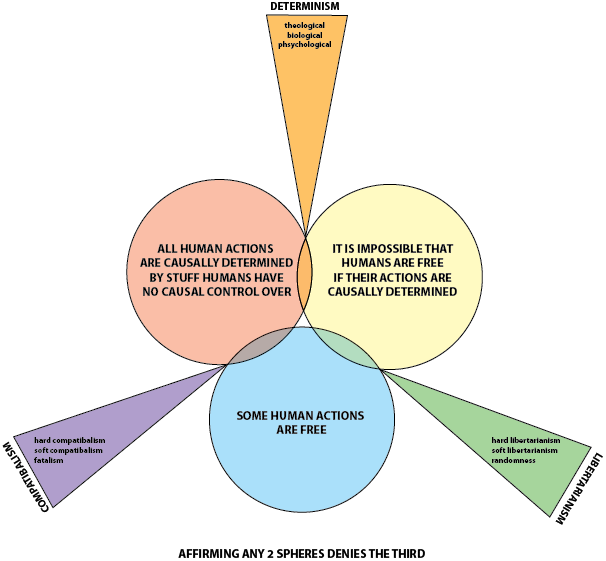Every now and then, on a Friday, I’ll step into the deep waters of Philosophy, ramble on about some idea and maybe even interact with something I might be reading. Most of the time, a real philosopher could probably read my drivel and speak into it offering a corrective—but for now I’ll speak from ignorance. After all, it is Friday; what better way to have fun than with philosophy. In this post I want to talk about Libertarian Free Will in 700 words.
To explain Libertarianism, I have to talk about the other types of Free Will. I think it’s helpful to note that modern Calvinists (I call them Edwardsians since they really follow his philosophical views on Free Will) completely pigeon hole Libertarian Free Will so that they can tackle it. They say things like “Libertarians believe that Free Will is the power of contrary choice” then easily dismantle that position by showing that sometimes we can’t make another choice.
That’s wrong though. The whole debate actually circles around three major spheres of thought.
Sphere (B-Blue) says that some Human actions are free. This doesn’t necessitate that all human actions are free (imagine being told what to do by gunpoint for instance) but it does support that at least some of their actions are free.
Sphere (R-Red) is that all human actions are causally determined by stuff humans have no causal control over. For instance, you may be reading in English because you were born in an English speaking family in a time that is predominantly English. You have no causal control over reading in English but you do read in English. That might be a bad example since being in an English speaking family doesn’t causally determine that you’ll read in English. Heck, you might be born blind so it really didn’t causally determine your reading English. Probably something closer to it would be that any event has some previous event that makes the current event necessary. So the fact you can’t fly isn’t because you chose not to fly, but because nature has causally determined that you aren’t equipped to fly.
Sphere (Y-Yellow) is that it is impossible that humans are free if their actions are causally determined. This sphere just says that whatever is happening in Sphere (B) it is incompatible with Sphere (R).
Now where any two of these Spheres are affirmed the remaining third is denied. So you’ll have Sphere-R and Sphere-B being affirmed but that is a denial of Sphere-Y. This overlap (Purple) is called compatibalism: they think some human actions are free but all human actions are causally determined. Compatibalism is affirmed by a wide group of views: hard compatibalists, soft compatibalits, and fatalists are just a few of them. These views aren’t all the same, but they’re part of the same family.
Overlapping Sphere-R and Sphere-Y would give you a family called determinism that has widely held views such as hard-determinism, soft-determinism, biological , etc. They don’t see any human actions as free.
Then you have the last pair, a joining of Sphere-Y and Sphere-B over against Sphere-R and this is called libertarianism. In this family of views you would have hard-libertarians, soft-libertarians, randomness and so on.
If you note the chart, “power of contrary choice” might go under the Libertarian family—but it doesn’t necessarily account for the entire family. Someone can believe that everything is random and not give a fig about contrary choice and still fall under the Libertarian family. Furthermore, someone can affirm that “Some human actions are not-free”. Like jumping off a bridge then changing your mind (ie: you no longer have the free will to change the fact that you’re falling) and remain a Libertarian.
You can’t, therefore, tackle the Green area by saying it affirms contrary-choice. What you need to establish is that Free will is actually compatible with causal determination and denying and actual fundamental sphere of Libertarianism.
Unfortunately, since a picture is worth a thousand words, I’ve gone over my limit to explain this.
—
I owe the simplicity of thought here to Thomas Flint and Kenneth Keathley.

